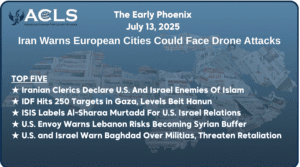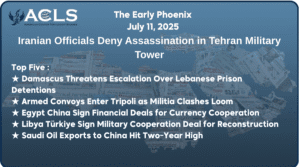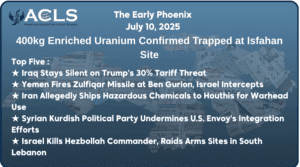Executive Analysis:
The situation continues to be characterized not only by heightened tensions and diplomatic activity but also by an evolving paradigm where traditional power dynamics are being challenged and reshaped. This shift is marked by a nuanced interplay between state and non-state actors, redefining regional alliances and rivalries.
The delayed Israel-Hamas ceasefire, influenced by escalated Israeli military actions, and the increased hostility of Yemen’s Houthi rebels, marked by missile strikes and maritime disruptions, exemplify these tensions.
The International Atomic Energy Agency (IAEA) raises alarms about Iran’s nuclear program, while Binance faces significant fines for sanctions violations, reflecting the intricate ties between global finance and international regulations.
Contrasting these security concerns, the Gulf region sees remarkable economic growth and strategic investments. Diplomatic efforts by Egypt and North African countries aim to stabilize the Gaza situation, while Syria confronts ongoing internal strife and external pressures.
Türkiye navigates complex relations with NATO and Russia, and Lebanon’s internal and external challenges are significantly influenced by Hizballah’s role, encapsulating the multifaceted and ever-evolving dynamics of the region.
This context below provides a unique lens through which the recent developments, including the delayed Israel-Hamas ceasefire and the assertive posturing of Yemen’s Houthi rebels, can be analyzed, offering insights into the subtleties of regional power politics and their broader implications on global stability (Rania Kisar).
=========================
Top 5 Headlines:
- Ceasefire Stalemate: Israel-Hamas Tensions Escalate Amid Regional Power Shifts.
- Iraq Tensions Soar: U.S. Forces Under Intensified Attacks.
- Binance Faces Record $4.4 Billion Fine Over Alleged Iran Sanctions Violation and Terrorist Funding.
- Houthi Group Launches Missiles at Eilat, Israel Intercepts.
- Positive Signs for Israeli-Saudi Talks.
=========================
ISRAEL & PALESTINIAN TERRITORIES
- Ceasefire Stalemate: Israel-Hamas Tensions Escalate Amid Regional Power Shifts.
The ceasefire between Israel and Hamas, which was initially anticipated for today, has been postponed. This delay is due to increased Israeli military activities in Gaza and Southern Lebanon. In Gaza, Israel has launched severe airstrikes, resulting in numerous casualties. Concurrently, the Israeli army arrested Mohammed Abu Salimia, the director of Gaza’s Al-Shifa Medical Complex. This arrest resulted in the suspension of Gaza’s coordination with the World Health Organization.ed to the suspension of coordination with the World Health Organization.
A senior aide to Prime Minister Netanyahu has announced a new deadline for the release of 50 Israelis held by Hamas. The deadline has been shifted from Thursday to Friday. This change suspends the 4-day ceasefire until a final agreement is reached. Additionally, the Israeli military has demanded the evacuation of the Indonesian Hospital in Gaza within four hours. They cite alleged military activities in the facility and threaten further action. This demand complicates the situation for approximately 200 critically wounded patients.
Furthermore, IDF paratroopers from the Givati Brigade conducted a raid on Hamas’ military intelligence headquarters in Gaza. This operation targeted underground infrastructure and resulted in the elimination of terrorists and the discovery of a workshop producing anti-tank missiles and explosive drones. Similar actions were taken earlier at Hamas headquarters in the northern Gaza Strip.
In Southern Lebanon, Israeli operations have resulted in Hizballah fatalities, further heightening regional tensions. In response to these developments, the Arab Islamic Committee, in a meeting with British Foreign Secretary David Cameron, urged the UN Security Council and international community to enforce an immediate and effective ceasefire in Gaza. Cameron expressed Britain’s support to prevent further escalation and emphasized the need for additional resources to maintain essential services in Gaza.
=========================
THE GULF REGION & YEMEN
- Qatar Announces Imminent Ceasefire in Gaza. Qatar’s Foreign Ministry spokesperson, Majed Al-Ansari, anticipates the announcement of a ceasefire in Gaza in the coming hours. Talks on the humanitarian truce between Hamas and Israel are progressing positively, with efforts from Qatar, Egypt, and the United States. The ceasefire involves a temporary exchange of prisoners and is expected to begin within 24 hours (Aljazeera).
- Saudi and U.S. Foreign Ministers Discuss Gaza Crisis. Saudi Foreign Minister Faisal bin Farhan received a call from U.S. Secretary of State Antony Blinken, addressing ways to halt the dangerous military escalation in Gaza. They emphasized the need for a humanitarian ceasefire agreement, discussed efforts for delivering aid to prevent a worsening humanitarian crisis, and strongly opposed forced displacement in Gaza. Bin Farhan called for international action against Israeli violations of international law and humanitarian principles, urging ethical responsibility to uphold legitimate international decisions (Al Nahar).
- Gulf States Break Records with $178.6 Billion Projects. Gulf Cooperation Council nations set a record with $178.6 billion in contracts since the start of 2023, surpassing the 2014 record. Saudi Arabia and the UAE exceeded previous records, contributing to the total. The sector’s heightened activity is attributed to oil prices, Saudi Vision 2030, Dubai real estate revival, and long-awaited projects in gas and petrochemicals. The market anticipates surpassing $185 billion by year-end, maintaining momentum into the next year (Alkhaleej Online).
- Positive Signs for Israeli-Saudi Talks. The U.S. National Security Council spokesperson, John Kirby, indicates ongoing normalization efforts between Israel and Saudi Arabia, despite initial communication halt. Kirby highlights “positive signals” for continued negotiations, addressing both the Israeli-Saudi relationship and efforts to secure the release of all Israeli captives. Kirby emphasizes the U.S.’s commitment to supporting Israel in the face of existential threats (i24).
- Houthi Group Launches Missiles at Eilat, Israel Intercepts. Houthi Group Houthi Group Escalates Hostilities with Israel, Launching Missiles and Seizing Vessels. Yemen’s Houthi rebels have intensified their aggression against Israel, marking a significant escalation in regional tensions. A Houthi spokesperson declared the launch of missiles at military targets in Israel’s Eilat, with Israel intercepting a cruise missile. This attack is part of a broader pattern of hostility, following the Houthi’s recent seizure of an Israeli-owned ship. Yemeni naval forces, aligned with the Houthis, persist in targeting Israeli ships and have advised companies against engaging with Israeli vessels. The region has seen a surge in Houthi drone and missile attacks on Israel lately.
Adding to the tensions, the Houthi group has issued a severe warning, identifying Red Sea shipping, especially Israeli-affiliated vessels, as “legitimate targets.” This follows their capture of an Israel-linked cargo ship in the Bab al-Mandab Strait, emphasizing their intent to target any ship associated with Israel in this strategic waterway.
Further compounding the situation, a Houthi commander was recently filmed aboard the hijacked vessel Galaxy Leader, reassuring the crew. The hijacking, a direct response to Israel’s actions in Gaza, targeted a vessel linked to an Israeli business figure. Japan is leading negotiations for the ship’s release. The Houthi-controlled port of Hodeidah presents strategic challenges, and Iran’s backing of Houthi forces heightens concerns over regional maritime security. This series of aggressive actions by the Houthis adds a complex and dangerous layer to the ongoing conflict in the Middle East (Aljazeera, New Arab, Maritime Executive).
=========================
IRAN
- IAEA Chief Alarmed by Iran’s Nuclear Moves: Bars Inspectors and Continues Enrichment. Rafael Mariano Grossi, the head of the International Atomic Energy Agency (IAEA), has raised serious concerns about Iran’s nuclear program, signaling a critical phase in regional and international security. Grossi underscored Iran’s alarming decision to prohibit experienced U.N. inspectors from monitoring its nuclear sites. This exclusion, which specifically targeted inspectors with significant expertise in enrichment processes, affects a substantial portion of the team designated for Iran. This move is seen as a significant obstacle, impeding the IAEA’s ability to effectively oversee Iran’s nuclear activities.
Compounding these concerns, Grossi has also expressed alarm over Iran’s continued progress in uranium enrichment, noting a troubling lack of advancement since March. He has called on Iran to adhere to its commitments and provide necessary technical details about its uranium particles. Emphasizing the escalating tensions in the region, Grossi has stressed the urgency of establishing the Middle East as a nuclear-free zone. These developments pose a challenge to international efforts aimed at maintaining peace and stability in the region (AP,Iran International).
- Binance Faces Record $4.4 Billion Fine Over Alleged Iran Sanctions Violation and Terrorist Funding. Binance, the world’s largest cryptocurrency exchange, has been hit with a historic $4.4 billion fine by the US government for its alleged involvement in breaching Iran sanctions and funding terrorism. The charges include money laundering, aiding terrorist networks, and violating sanctions on multiple countries, raising significant legal concerns for the crypto giant (Iran International).
- Iranian Leadership Criticizes Israeli Actions, Warns of Escalating Conflict. In a series of strong statements, Iranian President Ebrahim Raisi and the country’s Foreign Minister have voiced serious concerns and criticisms regarding Israel’s actions in the Gaza conflict. President Raisi has openly condemned what he describes as Israel’s desperation in the face of Palestinian resistance, asserting that the Israeli regime has failed to achieve its objectives in Gaza. He strongly emphasized the defense of Palestinian rights and decried the killing of women and children, stating that such actions do not equate to victory. President Raisi also pointed out the rising global anti-Zionist sentiment that has been fueled by the ongoing conflict. Simultaneously, Iran’s Foreign Minister, in a meeting with Lebanon’s caretaker Prime Minister, underscored the urgent need for intensified diplomatic efforts to establish a lasting ceasefire in Gaza. He issued a warning about the potential for drastic changes in the regional situation if Israel continues and expands its military actions. The Lebanese Prime Minister joined in criticizing what he sees as double standards in the international community’s responses to the conflict, while also acknowledging and praising Iran’s unwavering support for Palestine over the last 45 days. These statements from Iran’s top officials highlight the country’s stance on the conflict and its potential implications for regional stability. (Tasnim News, IRNA).
- IRGC Spy Ship Allegedly Assists Houthis in Seizing Red Sea Cargo Vessel. The IRGC’s Behshad spy ship is implicated in aiding Houthi rebels in capturing the Galaxy Leader cargo vessel in the Red Sea. The involvement of IRGC Quds Force commander Brig Gen Abdolreza Shahlaei, who is under a $15 million US bounty for attacks against Americans and allies, raises concerns. This incident is especially troubling as the Houthis, possibly mistaking the vessel for Israeli, aim to escalate tensions during the Gaza conflict (Iran International).
- Iran’s Secret Weapon: The Professors Basij Organization’s Suppression of Academic Dissent. The Professors Basij Organization (PBO), a shadowy IRGC-linked entity, actively targets Iranian university professors critical of the regime. Emerging as a potent force, it engages in surveillance, influences administrative committees, and promotes ideological indoctrination. The PBO’s recent expansion signals a concerning escalation in the regime’s crackdown on dissent within academic circles (Atlantic Council).
=========================
IRAQ
- Iraq Tensions Soar: U.S. Forces Under Intensified Attacks. The security situation in Iraq is deteriorating rapidly as Hizballah Brigades and other armed Iraqi factions intensify their attacks on U.S. forces, signaling a potential shift towards a broader conflict. Hizballah Brigades in Iraq have openly threatened to escalate their assaults, indicating the possible use of new, more advanced weapons. This alarming development comes as daily attacks by various Iraqi armed groups are becoming more frequent and sophisticated.
Mohammed Mahdi, a spokesperson for Hizballah Brigades, has strongly condemned the recent U.S. military strikes in Iraq. He accused the United States of violating Iraqi sovereignty and emphasized the groups’ determination to confront what they view as an occupying force. This statement reflects a growing sentiment among these factions and raises concerns about Iraq’s stability and sovereignty. In a related incident, armed factions affiliated with the “Islamic Resistance in Iraq” have claimed responsibility for a drone strike on a U.S. military base at Erbil Airport. This direct hit marks a significant escalation in the series of ongoing attacks on U.S. bases across Iraq. These developments have led to widespread condemnation and heightened calls for the withdrawal of U.S. forces from the country. The increasing frequency and severity of these attacks underscore the precarious nature of Iraq’s security environment and the potential for further destabilization (Sharq Awsat, Alsharq).
- Iraq Joins Nuclear Safety Agreement. Iraq’s Ministry of Foreign Affairs announces its accession to the nuclear safety agreement. The Permanent Representative to the International Atomic Energy Agency, Ambassador Bakr Fattah Hussein, deposited the accession document with the agency’s director-general. The move is seen as a significant step towards Iraq’s democratic renewal and its return to its natural standing in the international arena. The agency commends Iraq’s commitment and pledges support in various programs related to health, nuclear safety, radiation protection, and radioactive waste disposal (Al Iraq News).
=========================
EGYPT & NORTH AFRICA
- Regional Efforts Strengthen for Gaza Ceasefire and Humanitarian Aid. In a concerted effort to stabilize the situation in Gaza, key regional players are intensifying their diplomatic and humanitarian initiatives. President Biden, in discussions with Egyptian President Sisi, firmly opposed any forced displacement of Palestinians in Gaza and the West Bank, reiterating U.S. support for a Palestinian state and acknowledging Egypt’s pivotal role in the region. This conversation followed closely on the heels of the Israel-Hamas ceasefire announcement. Egypt has heightened security at the Rafah crossing in anticipation of the ceasefire, preparing for the arrival of aid convoys and the implementation of a prisoner exchange agreement between Israel and Hamas. Concurrently, positive talks between Qatar and Egypt are focusing on the details of this humanitarian ceasefire agreement’s execution. Additionally, Egypt and Jordan conducted a summit in Cairo to further solidify their unified approach. Both nations expressed strong support for the ceasefire and are working tirelessly for a permanent solution. They emphasize the need for sustained humanitarian aid to Gaza residents and firmly oppose any form of collective punishment or forced displacement of Palestinians. To facilitate humanitarian efforts, the Rafah border crossing has been opened for Palestinians stranded in Egypt, allowing for their voluntary return to Gaza. This opening also serves to expedite the delivery of urgent relief aid to Gaza, and provide medical treatment for the wounded Palestinians in Egypt, as well as enable foreign nationals in Gaza to travel back to their countries. These coordinated actions reflect a growing regional commitment to resolving the Gaza crisis and addressing the humanitarian needs of its residents.
=========================
SYRIA
- Israeli Strikes Keep Damascus and Aleppo Airports Offline. Damascus and Aleppo airports remain closed due to Israeli airstrikes for over a month, marking the longest shutdown since the conflict began in 2011. The strikes targeted Lebanon’s Hizballah, exacerbating travel challenges for Syrians. Israel has escalated attacks on Syria during heightened regional tensions (Alarabiya).
- Turkish Airstrikes Target Kurdish Leaders in Syria’s Hasakah. Turkish drone strikes hit the Hasakah province in northeast Syria, killing three Kurdish leaders and injuring five others from the Syrian Democratic Forces (SDF) and the Kurdistan Workers’ Party (PKK). The attacks targeted key figures and military points, escalating tensions in the region (Syria TV).
- Syrian Regime Lifts Security Check and Visa Requirement for Iraqis. The Syrian government removes security checks and visa requirements for Iraqi citizens at all land and sea border crossings. Iraqi travelers will now obtain a visa directly at the border entry points. The move aims to enhance economic relations, and recent diplomatic efforts indicate warming ties between Syria and Iraq (Syria TV).
=========================
TURKIYE
- Israeli Hostages’ Families Seek Erdogan’s Help Again. Israeli hostages’ families appeal to President Erdogan for assistance in a second letter, emphasizing his influential role. Despite protesting against Netanyahu, they request Erdogan’s intervention, recognizing him as a powerful leader. The letter urges Erdogan to use his influence with Hamas to ensure the hostages’ release (Hurriyet).
- Türkiye Delays Approval for Sweden’s NATO Bid. Türkiye notifies NATO of its decision to postpone the final approval of Sweden’s NATO membership bid, hindering expectations for a resolution at the upcoming foreign ministers’ meeting. The Turkish parliament’s foreign affairs commission plans to resume discussions next week. This leaves Sweden’s NATO accession pending during ongoing concerns (Daily Sabah).
- Russia Supports Turkiye’s Natural Gas Hub Ambitions. Russian Consul General in Istanbul, Andrey Buravov, highlights Russia’s commitment to Turkiye’s gas hub plans, following President Putin’s announcement. Trade between Turkiye and Russia exceeded $65 billion last year, and both countries are actively working on details for creating a natural gas hub in Turkiye. Buravov also emphasizes the ongoing gas shipments via the TurkStream pipeline, meeting Turkiye’s requested volumes and offering potential for exports to third countries (Aksam).
=========================
LEBANON
- Hizballah Affirms Commitment to Gaza Ceasefire, Links It to Southern Lebanon. A Hizballah official states the party was not part of Gaza ceasefire negotiations but emphasizes commitment as long as Israel adheres. The official notes that the ceasefire, including southern Lebanon, is supported by Hizballah, pledging compliance as long as Israel does. Hizballah warns of retaliation for any Israeli escalation in southern Lebanon or Gaza, and recent meetings with Hamas leaders discuss regional developments and coordination (i24).
- Son of Senior Hizballah Member Killed in Israel Airstrike in Lebanon. An Israeli airstrike in Beit Yahoun, south Lebanon, claimed the lives of five Hizballah fighters, including Abbas Raad, son of senior Hizballah member Mohammad Raad. The strike intensified tensions, with a total of 85 Hizballah fighters killed since the border clashes began. The Israeli military has not commented on the incident (Jerusalem Post).
=========================
Follow the latest news from the American Center for Levant Studies via Google News
For more in-depth analysis, see The Region



